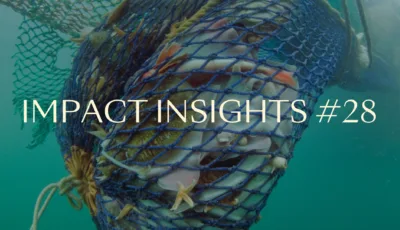Impact Insights #19

Our impact analyst, Oda Standal, has compiled the latest news from the sustainability field to provide a concise update on what you need to know.
■ Denmark proposes ambitious 2050 climate targets and to accelerate neutrality goal to 2045
The Danish government has proposed to raise Denmark’s 2050 climate target to a 110 percent CO2 reduction compared to the 1999 level. The same proposal moves up the climate neutrality target to 2045. The updated targets are yet to be adopted by the Parliament. Still, they have been welcomed by the Danish Climate Council: its recent analysis of the country’s climate targets concluded that it’s realistic for Denmark to reach its 2050 targets, as 90% of the required efforts rely on known solutions. Some of the most important measures are taking lowland soils out of agricultural production to reduce the risk of flooding, planting more forests, phasing out the use of gas in private homes and industry, switching to electric cars, and using existing technologies to store CO2 underground. The council's analysis concludes that the transition is possible, but decisions must be made now.
■ Global CO₂ emissions set to rise in 2024, highlighting urgent need for climate financing
Although many had predicted that emissions would peak in 2023, data from the first half of 2024 suggests that Global CO₂ emissions are projected to rise by 0.6% in 2024. The estimations are based on data from the International Energy Agency (IEA) and the U.S. Energy Information Administration (EIA). Key drivers include increased natural gas consumption and a rebound in international aviation and shipping. While coal and oil emissions are steady, China’s emissions could decline due to increased hydropower production. EU emissions are also expected to drop by 7%. However, U.S. emissions are predicted to grow by 0.4%, driven by higher energy demand, and India's emissions may increase by 6% due to economic growth. The emissions figures may put additional pressure on climate negotiators meeting at the COP29 climate summit in Baku in November. The main topic there will be climate financing – specifically, how the world can mobilize the necessary capital for energy transition and climate adaptation.
■ UN warns of rapid sea-level rise in Pacific islands, urges increased financial support for climate resilience
At the recent Pacific Islands Forum, the U.N. Secretary-General Antonio Guterres issued an urgent warning about the accelerating sea-level rise in the southwestern Pacific. He noted that the region is experiencing some of the fastest rates of sea-level increase - up to three times faster than the global average. Guterres emphasized the dire need for stronger financial commitments from developed nations to help fund both climate mitigation and adaptation efforts. Specifically, he called for significant investments in climate resilience infrastructure and highlighted the importance of the recently established "loss and damage" fund aimed at supporting vulnerable countries. Some islands are already experiencing significant land loss, leading to the displacement of communities. Many of these nations, such as Tuvalu and Kiribati, are particularly vulnerable, as they are only a few meters above sea level. If sea levels continue to rise, entire countries could be submerged by mid-century. The loss of land threatens not only homes but also infrastructure, freshwater sources, and food security, which could trigger a wave of 267 million climate refugees.
■ EU report proposes major overhaul for sustainable Agriculture
After seven months of negotiations, the EU has united farmers, agricultural groups, environmental organizations, and other stakeholders around a shared vision for European agriculture. A new report, presented to European Commission President Ursula von der Leyen this week, outlines plans to make European agriculture more sustainable while boosting farmers' economies. The report calls for a major overhaul of the EU's Common Agricultural Policy (CAP), which currently provides subsidies based on farm size rather than income. It proposes shifting subsidies to support farmers who need them most. It also recommends encouraging reduced meat consumption through subsidies and labeling and suggests a buyout program for farmers in high-intensity meat production areas. To support these changes, the report advocates for a temporary "just transition" fund for the agricultural sector. Although the recommendations in the report are not binding, getting this group of organizations to endorse a report that both acknowledges the economic challenges faced by farmers and proposes significant steps toward more sustainable food production is historic.


